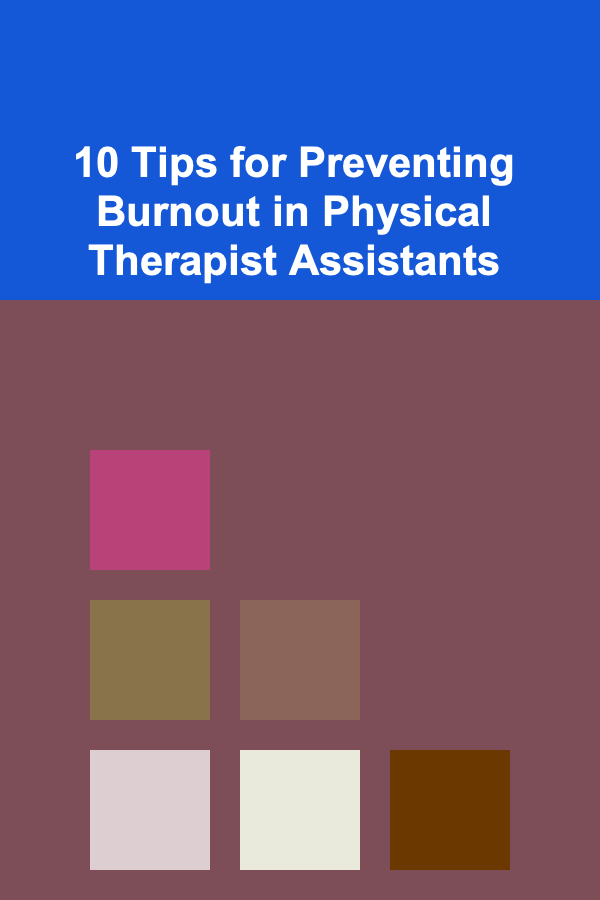
10 Tips for Preventing Burnout in Physical Therapist Assistants
ebook include PDF & Audio bundle (Micro Guide)
$12.99$11.99
Limited Time Offer! Order within the next:

Physical Therapist Assistants (PTAs) are critical members of the healthcare team, providing valuable support to physical therapists in helping patients regain their mobility and improve their quality of life. However, the nature of the job can be physically and emotionally demanding, and without proper self-care, PTAs are at risk of experiencing burnout.
Burnout is a state of emotional, mental, and physical exhaustion caused by prolonged stress and can affect one's ability to provide quality care. It can lead to feelings of fatigue, decreased job satisfaction, and a reduced sense of accomplishment, which ultimately impacts patient care. The pressures of managing multiple patients, working long hours, and the emotional toll of helping those in pain can all contribute to burnout.
This article provides ten practical tips that Physical Therapist Assistants can use to prevent burnout and maintain their well-being in a challenging but rewarding field.
Set Boundaries with Patients and Colleagues
Setting healthy boundaries is one of the most important ways to prevent burnout. PTAs often work in environments where they must balance the needs of multiple patients, while also maintaining a positive relationship with colleagues. This can be overwhelming without clear boundaries.
It's essential to know your limits when it comes to workload, emotional involvement, and time commitments. While it's important to provide compassionate care to patients, it's equally important to ensure that you're not sacrificing your own mental and physical health. For example, if a patient requires more time than what is manageable, communicate with your supervisor or physical therapist about how best to handle the situation.
Tip: Regularly check in with yourself to assess your energy levels and emotional state. If you're feeling drained or overwhelmed, don't be afraid to speak up and ask for help.
Prioritize Self-Care
Taking care of your physical, mental, and emotional well-being is vital to avoiding burnout. As a PTA, you spend a lot of time taking care of others, but it's important to remember that self-care is just as crucial.
Make sure to set aside time for activities that replenish you. This might include exercise, meditation, spending time with loved ones, or engaging in hobbies that bring you joy. Prioritizing self-care allows you to recharge, so you can show up to work feeling refreshed and ready to give your best to patients.
Tip: Plan regular self-care activities throughout your week and treat them as non-negotiable appointments in your calendar.
Maintain a Healthy Work-Life Balance
Work-life balance is critical for preventing burnout in any profession. PTAs often have unpredictable schedules, which can lead to long hours or the pressure to take on extra tasks. However, it's important to ensure that work does not consume your entire life.
Make time for activities outside of work that bring you joy and relaxation. Set clear boundaries between work and personal time. For example, avoid answering work-related emails or phone calls once you're off the clock unless it's an emergency.
Tip: Consider creating a daily or weekly schedule that includes both work commitments and personal activities, so you can maintain a healthy balance.
Stay Physically Active
Physical therapy work is demanding on the body. PTAs spend a lot of time on their feet, moving patients, adjusting equipment, or demonstrating exercises. Without proper physical activity outside of work, this can lead to fatigue, muscle strain, and overall physical burnout.
Engage in activities like yoga, swimming, or running to keep your body in good shape. Regular physical activity can improve your energy levels, help prevent injuries, and reduce stress. It's also a great way to clear your mind after a busy day.
Tip: Incorporate short stretches or simple exercises into your daily routine to help relieve tension and prevent long-term physical strain.
Build a Support System
One of the best ways to manage stress and prevent burnout is by having a strong support system. This includes both personal and professional support networks. Having colleagues you can talk to about the challenges you face, as well as friends and family who provide emotional support, is key to maintaining a healthy work-life balance.
When you have a support system, you are less likely to feel isolated or overwhelmed by the stresses of your job. Seek out opportunities to connect with other PTAs, attend professional networking events, or join online communities where you can share experiences and advice.
Tip: Schedule regular check-ins with friends or family to talk about your day or vent your frustrations. It can make a huge difference in your overall well-being.
Recognize the Signs of Burnout Early
Being aware of the early warning signs of burnout is essential for taking action before it becomes overwhelming. These symptoms may include fatigue, irritability, lack of motivation, and physical ailments like headaches or back pain. If you start noticing these signs, it's important to acknowledge them and take steps to address the issue before it worsens.
By recognizing burnout early, you can make adjustments to your workload, practice better self-care, and seek professional help if necessary. Early intervention is key to preventing long-term effects on your health and your job performance.
Tip: Keep a journal of your feelings and physical symptoms to track when burnout symptoms start to emerge. This can help you identify patterns and take action sooner.
Seek Professional Development Opportunities
A lack of professional growth can contribute to burnout by leaving PTAs feeling stagnant or disconnected from their work. Engaging in ongoing education and professional development can help reignite your passion for the job and provide new strategies for handling patient care.
Consider attending workshops, pursuing additional certifications, or participating in continuing education courses related to physical therapy. This can give you a fresh perspective on your work, boost your confidence, and make your day-to-day tasks more enjoyable.
Tip: Set a goal to complete at least one professional development activity each year to keep your skills and knowledge sharp.
Practice Stress Management Techniques
Stress is an unavoidable part of any healthcare profession, but how you manage it makes all the difference. Incorporating stress management techniques into your daily routine can help prevent burnout and improve your overall quality of life.
Techniques such as mindfulness, deep breathing, progressive muscle relaxation, and guided imagery can reduce stress and anxiety. Even simple strategies, like taking a few minutes each day to practice deep breathing or meditate, can help you manage stress effectively.
Tip: Dedicate a few minutes every morning or evening to practice stress-reduction techniques. This will help you start and end your day feeling more grounded and relaxed.
Delegate When Possible
As a PTA, it's common to have a heavy workload. While it's important to be dedicated to your job, it's equally important to recognize when you're spreading yourself too thin. Learning to delegate tasks when possible can prevent burnout and allow you to focus on what truly matters.
If you work with a team of physical therapists or other healthcare providers, collaborate with them to share responsibilities. Also, delegate non-clinical tasks to administrative staff if your workplace allows it. This will free up your time and reduce unnecessary stress.
Tip: Develop a system to prioritize your tasks and delegate appropriately, ensuring you're not overwhelmed by minor responsibilities.
Seek Help When Needed
Finally, it's important to recognize when you need help. Burnout is a serious issue, and seeking help from a supervisor, therapist, or counselor can be incredibly beneficial. Talking to a mental health professional can help you work through the emotional and mental challenges of your job and provide valuable coping strategies.
If you feel that burnout is becoming unmanageable, don't hesitate to reach out for support. Whether it's through professional counseling, employee assistance programs (EAPs), or talking to your supervisor, there are resources available to help you.
Tip: Keep a list of resources and contacts you can reach out to if you're feeling overwhelmed. Having a plan in place for seeking help can reduce feelings of isolation and frustration.
Conclusion
Preventing burnout as a Physical Therapist Assistant is critical for maintaining your health, job satisfaction, and the quality of care you provide to patients. By setting boundaries, practicing self-care, managing stress, and seeking professional growth, you can ensure that you remain physically, mentally, and emotionally equipped to handle the demands of the job.
Burnout is a real risk, but with proactive strategies, it's possible to avoid or manage its impact. Remember, taking care of yourself allows you to take better care of others. Prioritize your well-being, and don't be afraid to seek support when needed. The more you invest in yourself, the better equipped you'll be to thrive in your career as a PTA and continue making a positive impact on the lives of your patients.
Reading More From Our Other Websites
- [Personal Finance Management 101] How to Invest in Stocks for Beginners: A Simple Guide
- [Personal Care Tips 101] How to Treat Acne with Natural Ingredients in Your Acne Cream
- [Polymer Clay Modeling Tip 101] Best Practices for Creating Detailed Polymer Clay Architectural Models of Historic Buildings
- [Ziplining Tip 101] Capturing the Thrill: How to Get the Perfect Zipline Shot Every Time
- [Organization Tip 101] How to Collaborate with Other Organizations for Greater Impact
- [Small Business 101] Best Small Business Sustainability Practices: Eco‑Friendly Strategies That Work
- [Organization Tip 101] How to Organize Your Professional Development Goals
- [Organization Tip 101] How to Foster Open Communication in Your Family
- [Home Party Planning 101] How to Plan a Poolside Party at Home for Summer Fun
- [Organization Tip 101] How to Organize Your Home Bar for Entertaining

How to Clean Your Home Using a Cleaning Schedule
Read More
How to Schedule Regular Pest Control Inspections
Read More
How to Set Up a Pet-First Aid Kit for Emergencies
Read More
How To Understand the Genetics of Human Behavior
Read More
How To Find Affordable Transportation Alternatives
Read More
Building a Thriving Community Around Your Print-on-Demand Brand
Read MoreOther Products

How to Clean Your Home Using a Cleaning Schedule
Read More
How to Schedule Regular Pest Control Inspections
Read More
How to Set Up a Pet-First Aid Kit for Emergencies
Read More
How To Understand the Genetics of Human Behavior
Read More
How To Find Affordable Transportation Alternatives
Read More